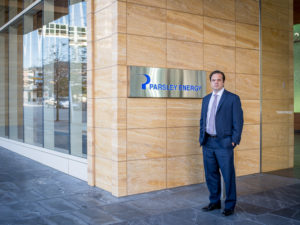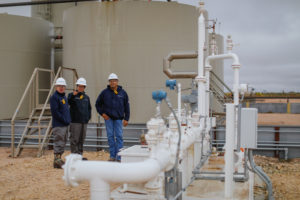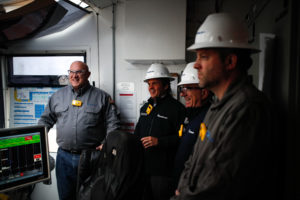 “Everyone’s looking at you and expecting you to do nothing.”
“Everyone’s looking at you and expecting you to do nothing.”
Third generation oil entrepreneur Bryan Sheffield credits those words whispered in his ear by father Scott Sheffield, founding CEO of Pioneer Natural Resources, as helping challenge him to instead do much with his life’s opportunities.
The younger Sheffield—also the grandson of Parker and Parsley founder Joe Parsley—recalls his father challenging him thusly as he introduced Bryan to other executives at oil gatherings during Bryan’s formative years. Indeed, many who are reared in such circumstances tend to take such privilege for granted. Bryan Sheffield instead saw this rich store of family knowledge as a deep well to be treasured, drilled, and produced for all it was worth.
While he fully understood his father’s purpose with those words, Sheffield says they still worked. “They fired me up to go get it done—to go build a company.” He did exactly that in 2008, taking over Parker and Parsley’s original 100 wells under the revamped name of Parsley Energy. He sold Parsley to Pioneer in 2021, and is now managing partner of Formentera Partners, an energy-focused private equity strategy.
He has been credited with leading the second most successful exploration and production IPO in history upon taking Parsley public in May of 2014, and was recognized among Forbes’s 40 Under 40.
From Trader in Spain to Oilfield 101
At the start of his career, however, Sheffield wanted nothing to do with the oil patch, preferring to make his own way, clerking on the trading floor for First Continental Trading in Chicago. The company’s bread and butter was trading short term interest rates. After a year in that position, he wanted to move up to being a trader of those interest rates—a promotion that came with a move to Gibraltar, on the southern tip of the Spanish peninsula, which overlooks entry into the Mediterranean.
After two years there, in which “I never really made money trading. I guess I never really took enough risks to lose money or make money.” During that time he did see a number of coworkers fired for losing too much money, so he did better than they did.
Marrying a local girl in Gibraltar gave Sheffield a new focus, knowing he’d need to “get busy” to support a family. With that in mind, he moved them back the United States.
Grandpa Joe Parsley offered Sheffield the opportunity to take over and operate Parker and Parsley’s original 100 wells as a contract operator. “He had a contract operating right to take back operation of those wells.” Parsley had taken them back from P&P’s successor company, Pioneer, in the late 1990s. He was then ready to give them to his grandson.

Parsley Energy executive field tour photographed October 30, 2019 in Midland, Texas.
Photo Credit: James Durbin / The Oilfield Photographer, Inc.
Admitting “At the time, I didn’t even know what that meant,” he told his father about Grandpa’s offer. Dad was pleased, but wisely put conditions on the proposition. He said, “You’re not going to go do that cold turkey. You’ve got to come work at Pioneer for a couple of years and learn about operations.”
“He put me in this crash course, I call it ‘Crash Course Oilman 101’” said the younger Sheffield, “and I learned a little bit about every part of the business.”
This course involved one to three months each in reservoir engineering, drilling, operations, geology, accounting, and six months in the land department along with six months working in the field. He also learned how departments such as land and accounting were connected through joint interest billing.
All that training taught him that the need for learning never stops. “That’s what’s so great about this business of oil and gas, is, every day you learn something new, no matter matter how many years you have in the business.”
The Parsley and Parker Magic
During that time Sheffield talked to his grandfather every day, and was amazed at the elder’s total recall of the history of every single one of the hundred wells that had been drilled in the 1970s. Joe Parsley passed away in 2015.
“I was very fortunate to learn from him. I was just a sponge. I just wanted to learn more, and I asked more and more questions.”
Sheffield completed his training in 2008, taking over the wells and starting Parsley Energy, naming it in honor of his grandfather, with the latter’s blessing. At his grandfather’s urging, he located in Midland instead of Houston, in order to build the network he would need. That location would pay off very quickly. More on that later.
Little did Sheffield know the extensive good will that name carried throughout the community—good will that would help him grow the business from day one. “He had this great reputation—he and Howard Parker. [So] when we started to operate wells, surface owners and mineral owners would call me when other operators would send a lease.” Those owners told Sheffield that they fondly remembered Parker and Parsley, recalling the former’s excellent treatment of mineral and surface owners, and that they would rather lease to the Parsley name.

Parsley Energy executive field tour photographed October 30, 2019 in Midland, Texas.
Photo Credit: James Durbin / The Oilfield Photographer, Inc.
“The Parsley name gave me a little edge, where I could be in on every deal.” While Sheffield appreciated the goodwill his grandfather, and his father as Pioneer CEO, had sown in the community, he also felt a responsibility to live up to that name himself.
Upon leaving Oilfield 101 and launching his own company, Sheffield says he then was strictly in competition now with Pioneer—no favors asked or given from the former Mother Ship.
He did bring with him a love for the field, tying field operations with his understanding of how each decision fits into the bigger pictures.
“I love going out in the field more than anything,” he said. He lists pulling units that repair casing or tubing leaks at the top of the list. He loves “trying to figure out if it’s economic to work over the well or not. What’s the payout on each workover? To save the well and to save the lease? The operations side of the business is the most exciting part.”
That love for the big picture would pay off very quickly as Parsley faced big challenges right off the bat.
How Chicken Nuggets Saved the Day
The years 2008 and 2009 saw the housing crash and economic dip, which dropped oil prices from a previously lofty perch. Many startups would have seen this as a major challenge, but for Sheffield the bigger one came once prices rebounded and huge drilling programs resumed. Here his relatively small startup was suddenly a nobody with service companies, as completion firms concentrated on their larger clients.
Running about three rigs, Parsley’s drilling program was on schedule. But the majors and larger independents had scheduled up all of the completion crews, and Sheffield’s list of drilled, uncompleted (DUCs) wells was growing, reaching 40 at one point. He’d been “fired,” in his words, by some of the top frac companies in the industry, for being too small to deal with, something he saw happen to other smaller operators as well.
To fund the startup, Sheffield had tapped investors in Midland and Houston, along with people he knew from his Chicago job. He’d promised all of them a piece of the profits from new wells the company was planning. The sudden inability to get wells completed played havoc with those promises—and Sheffield knew he had a longtime family reputation to uphold.
So he got creative, doing a kind of role reversal.
“You know how these service companies bring breakfast to you [operators] to get service? Well, this was a moment in time that they’re not bringing breakfast, they’re just catering to the big companies.

Parsley Energy executive field tour photographed October 30, 2019 in Midland, Texas.
Photo Credit: James Durbin / The Oilfield Photographer, Inc.
“So I brought breakfast to BJ Services and Cudd—those good little chicken nugget biscuits—and sure enough, I got on their frac cancellation list.” He believes those chicken biscuits propelled him to the top of the pecking order for cancellations. They told him that if he had wells that were drilled and had a frac pond ready, they would do the frac job if they had a cancellation.
Within two months, all 40 wells had been completed and were producing.
“They said they’d never, ever seen this before, that an operator brought them breakfast.”
So the wells are producing copious amounts of oil, and all is well, right?
Not so fast, Sheffield recalled. He still had to get the oil hauled to the pipeline—and he faced the same problem with oil haulers as he’d seen with frac companies. They were too busy serving the big firms.
Transitioning on his meal choice, Sheffield began taking various oil haulers’ sales people to lunch, whereupon he would ask how to get them to pick up his oil. “They started introducing me to the dispatchers, and they brought the dispatchers to lunch to meet me.” He gave those dispatchers Parsley Energy hats, shirts, and other reminder items.
It worked. Sheffield began getting calls offering pickup services whenever there was a cancellation. “This is just good old boy hustling,” he said. “I was gaining my relationships with the vendors.”
His biggest takeaway was, “When it’s hard times with the vendors, they help you, you help them.”
Former Parsley COO (later CEO after Sheffield’s December 2018 departure) and current President and CEO of Greenlake Energy, Matt Gallagher, says he really appreciated this view. “Bryan always told us to think about the vendors, to always leave meat on the bone, that they are in business too. That’s how he ran a business transaction.”
The Sheffield Shuffle
Gallagher also fondly recalls certain celebratory actions. In Parsley Energy’s early days, drilling mostly vertical wells, Sheffield and Parsley cofounder Paul Treadwell had promised investors that those wells would produce at 60 BOPD at best. Treadwell, onsite, began calling back to the office to report flows of more than 100 BOPD.
Sheffield was so excited, his response was to do what became known as “the Sheffield Shuffle,” said Gallagher. “He can’t dance, and that’s why it had its own name.” Those well results were the inaugural exhibit of said Shuffle.
During the more recent downturns survival lessons revolve around debt loads. Many associates his father and Endeavor founder Autry Stephens have preached the virtues of optimizing debt—having enough to protect equity, but not so much as to drag the company down when prices drop. “I read somewhere that 80 percent of the bankruptcies in 2020 in the United States were energy related,” he said.
Stephens adds, “Bryan’s story is inspiring, and a classic example of how an entrepreneur can create jobs and wealth under our free enterprise system. The best part of the story is that—even after achieving success and wealth at a very early age—Bryan remains a good person and family man, with his feet firmly on the ground.
The Future
Should any of his children decide to make a fourth generation in the oil patch, they will face a different future. ESG and environmental concerns are already changing the way operators work, reducing flaring and stopping leaks, which he sees as positives.
Despite energy transition pushes, he sees the need for oil, and especially gas, to continue for possibly another 200 years. For his children’s generation, “It will look a lot different, but there’s still a lot of opportunity.”
____________________________________________________________________________________________________
Paul Wiseman’s email address is fittoprint414@gmail.com.









